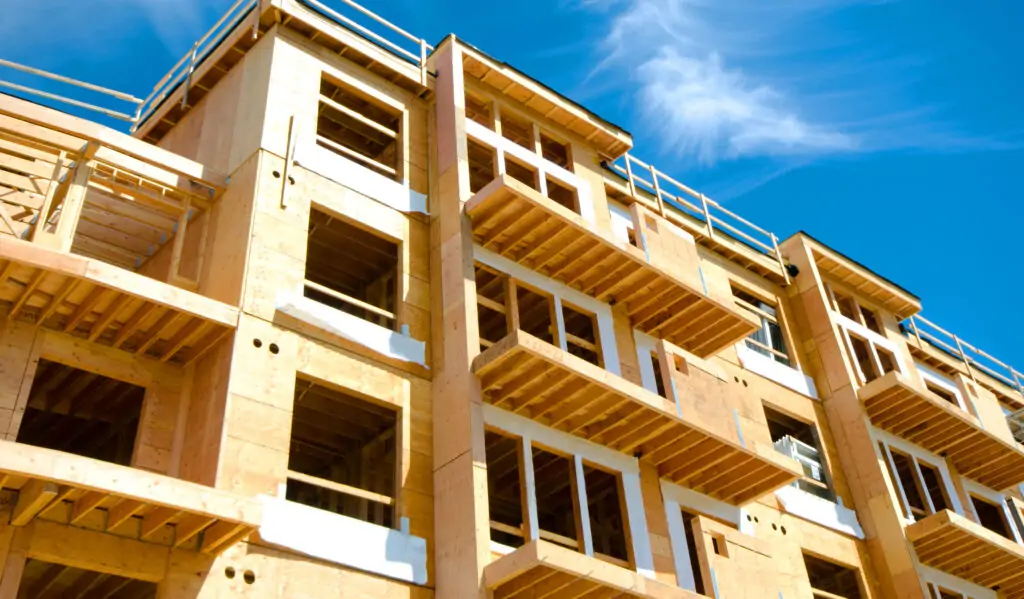
Apartment Construction Loans
An apartment construction loan is a specific type of financing used to cover the costs associated with the construction of multifamily residential units. These loans provide essential funding for builders and developers aiming to construct apartment buildings.
Apartment construction loans, also known as loans for apartment construction, are short-term loans used to finance the building of apartment complexes. Unlike traditional mortgages that provide a lump sum for the purchase of an existing property, these loans are usually disbursed in stages as the construction progresses.
Construction loans can be transformational for businesses in the construction industry, offering them the financial leverage they need to embark on large-scale apartment projects. Apartment construction financing is typically set up as interest-only during the construction period, which usually lasts from 18 to 24 months. After the construction is complete, the loan either becomes due or converts into a long-term loan.
Finding the right apartment construction lenders is crucial to securing favorable loan terms and ensuring the success of your project. Lenders typically base the amount they’re willing to loan on the projected value of the completed project and the borrower’s financial stability.
How Do Apartment Construction Loans Work?
An apartment construction loan operates in a unique way, providing funds incrementally during various stages of the construction process instead of a lump sum at the beginning.
When a developer or builder obtains an apartment construction loan, the loan is initially in a “draw period,” usually aligning with the construction phase. During this phase, the borrower can draw from the total loan amount to pay for construction costs as the project progresses.
Unlike traditional loans, where the borrower receives the full loan amount upfront, apartment construction loan disbursements, known as “draws,” are tied to a schedule of construction milestones. This could include stages such as completion of the foundation, framing, or other significant construction phases. At each milestone, the lender typically sends an inspector to ensure the work has been completed before releasing the next draw.
The loan terms are structured as interest-only payments during the construction phase. This means that during the draw period, the borrower is only required to pay the interest on the amount drawn so far, not the principal.
Once construction is completed, the loan enters the repayment period. At this point, it typically converts into a traditional mortgage, and the borrower begins to pay both the principal and interest or the loan might need to be refinanced into a permanent loan structure.
The Benefits of Taking Apartment Construction Loans
Benefits of apartment construction loans include:
- Flexibility: Apartment construction loans provide the borrower with a flexible financing structure, enabling them to draw funds as needed during the construction process.
- Interest-Only Payments: During the construction phase, borrowers typically only pay interest on the amount drawn, which can ease financial strain during this capital-intensive period.
- Project-Specific Financing: These loans are specifically designed to fund the construction process, catering directly to the unique needs of apartment builders.
- Loan Conversion: Many construction loans convert into traditional mortgages after construction is completed, providing a seamless transition from construction to operation.
Understanding Apartment Construction Loans Amounts & Rates
Apartment construction loan amounts depend significantly on the projected cost of the construction project, the anticipated value of the completed project, and the borrower’s financial standing. Generally, these loans can range from $500,000 to upwards of $50 million, depending on the scale and nature of the project.
Repayment terms for apartment construction loans often involve a draw period during construction where interest-only payments are made, followed by a repayment period. The draw period usually lasts from 18 to 24 months, aligning with the construction phase. Following construction, the loan typically converts into a conventional mortgage, with repayment periods usually ranging from 15 to 30 years.
Interest Rates for Apartment Construction Loans
Interest rates on apartment construction loans can vary widely based on the lender, the borrower’s creditworthiness, and market conditions. Rates generally ranged from 8% to 16%. However, interest rates can fluctuate, so it’s always important to check the current rates before applying for a loan.
Explore the Various Types of Apartment Construction Loans
| Loan Type | Key Features |
| Construction-Only Loan | A short-term loan used to cover the cost of construction. Borrowers must refinance into a permanent loan or pay off the full balance once construction is complete. |
| Construction-to-Permanent Loan | This loan combines a construction loan with a traditional mortgage. The construction loan is converted into a mortgage once the project is complete. |
| Mini-Perm Loan | This short-term financing option provides funds for the initial construction phase and a few years of operation until long-term financing can be secured. |
| Bridge Loan | A short-term loan that provides immediate cash flow to cover expenses during the transition from construction to permanent financing. |
Apartment Construction Loans: Learn its Legal Considerations
Legal considerations for apartment construction loans include:
- Regulatory Compliance: The construction project must adhere to local, state, and federal building codes and regulations. Failure to do so can result in fines, delays, or even cessation of construction.
- Zoning Laws: The project site must be correctly zoned for the intended use. It’s crucial to confirm zoning regulations before purchasing land or starting construction.
- Construction Contracts: These should clearly define the scope of work, payment terms, change order procedures, and dispute resolution mechanisms. It is recommended to have these contracts reviewed by a legal professional.
- Liens: Contractors or suppliers may file liens against the property if they are not paid. A lender may require a lien waiver from each contractor or supplier.
- Insurance: Borrowers should carry adequate insurance coverage to protect against construction risks, including liability and builder’s risk insurance.
Apartment Construction Loans: How to Qualify
Qualifying for an apartment construction loan typically involves meeting specific criteria related to your creditworthiness, financial stability, and the viability of your construction project.
Apartment construction loan qualification criteria include:
- Credit Score: A solid credit score is crucial when applying for an apartment construction loan. Lenders view a high credit score as an indicator of financial responsibility and low risk. A credit score of 680 or above is usually preferred by most lenders.
- Financial Statements: Lenders will want to review your financial statements, including balance sheets, income statements, and cash flow statements, to assess your financial health and ability to repay the loan.
- Experience in Construction or Real Estate Development: Lenders prefer borrowers who have a proven track record in construction or real estate development. This experience demonstrates that you have the necessary skills to complete the project successfully.
- Detailed Construction Plan: A comprehensive construction plan is essential. This should include details about the project’s timeline, budget, and the team involved. The more detailed and realistic your plan, the more confidence lenders will have in your project.
- Loan-to-Cost Ratio (LTC): This ratio compares the loan amount to the project’s expected cost. A lower LTC means you’re contributing more of your own funds to the project, which can make you a less risky borrower. Typical LTC ratios range from 60% to 80%.
- Loan-to-Value Ratio (LTV): This ratio compares the loan amount to the projected value of the finished project. Most lenders prefer a LTV of around 70% or less.
- Exit Strategy: Lenders want to know how you plan to repay the loan once the construction is complete. This could involve selling the apartments or converting the construction loan into a traditional mortgage and collecting rental income.
Application Process Steps Involved in Apartment Construction Loans
Applying for an apartment construction loan can seem like a complex process, but breaking it down into manageable steps can make it much easier to navigate.
The steps to apply for an apartment construction loan include:
- Preliminary Assessment: Assess your financial situation, project feasibility, and determine how much you’ll likely need to borrow.
- Find the Right Lender: Research various lenders to find the one that best suits your needs, keeping an eye on their loan terms, interest rates, and loan amounts.
- Prepare Your Application: Fill out the loan application provided by the lender. This usually involves providing details about your financial history, credit score, and information about the construction project.
- Compile Necessary Documentation: Gather the necessary documents, which typically include financial statements, a detailed construction plan, and information about your construction or real estate development experience.
- Submit Your Application: Once your application and documents are ready, submit them to your chosen lender.
- Undergoing the Review Process: The lender will review your application and may ask for additional information or clarification.
- Loan Approval: If your application is approved, the lender will provide the terms of the loan for your review.
- Closing the Loan: If you agree with the terms, you’ll move forward to closing the loan. This involves finalizing the loan agreement and setting up the loan’s disbursement schedule.
Choosing a platform like National Business Capital (NBC) simplifies this process significantly. NBC allows you to apply once and then matches you with the most competitive offers you qualify for within their 75+ lender marketplace. This saves the business owner time and reduces the stress of selecting the best offer. NBC’s team assists clients with ROI guidance and strategies to maximize the value of their financing, aiming to establish a financing relationship for future capital needs beyond the initial transaction.
Learn Alternative Options for Apartment Construction Loans
| Financing Option | Loan Amount | Repayment Term | Required Collateral |
| Commercial Real Estate Loan | Typically up to 85% of property’s value | 5-20 years | Real estate property |
| Business Line of Credit | $10,000 to $1 million | Revolving | Varies by lender |
| SBA 7(a) Loan | Up to $5 million | Up to 25 years | Personal guarantee, collateral |
| Private Investor Funding | Varies based on agreement | Varies based on agreement | Varies based on agreement |
Frequently Asked Questions
What factors determine the loan amount of apartment construction loans?
The loan amount for an apartment construction loan is determined by several factors, including the projected cost of the construction project, the anticipated value of the completed project, and the borrower’s financial standing. Lenders also look at the Loan-to-Cost (LTC) and Loan-to-Value (LTV) ratios to decide on the loan amount.
How long does it take to get an apartment construction loan approved?
The approval timeline for an apartment construction loan can vary based on the lender and the complexity of the proposed project. Generally, the process can take anywhere from a few weeks to a few months. It’s recommended to start the loan application process well in advance of your projected construction start date.
How are the loan funds disbursed during the construction process?
Funds from an apartment construction loan are typically disbursed in stages or “draws” as construction milestones are reached. This method ensures that funds are used appropriately throughout the construction process. Each draw requires an inspection to verify that the previous stage of construction has been completed.
What are the collateral requirements for an apartment construction loan?
Collateral for an apartment construction loan usually includes the property being constructed and possibly other assets. In many cases, the land and the improvements (building) serve as the collateral.
Can I obtain an apartment construction loan if I have bad credit or no credit?
While it’s possible to obtain an apartment construction loan with bad or no credit, it’s more challenging. Lenders see credit history as an important indicator of financial reliability. Applicants with lower credit scores may face higher interest rates or might be required to offer additional collateral.
Ready to See Your Options?
Go from application to approval in hours, not months, with a streamlined process that merges high-tech with human-touch for high-efficiency financing.


